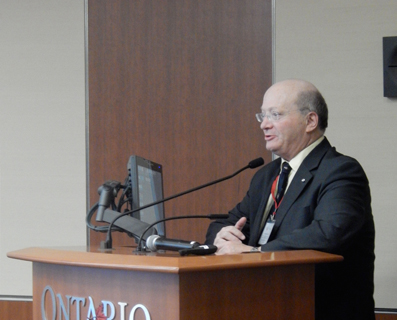An effective and well-maintained infrastructure is the cornerstone of a strong economy and the foundation upon which thriving communities are built. As Canada emerges from a recession, infrastructure investment is the key to strengthening our economy and building for the future.
Investment in Canada’s infrastructure supports Canadian firms which in turn increases productivity, generates wealth, fosters innovation, attracts investment and boosts employment. This will also improve Canada’s position in the global marketplace and the quality of life for people across the country.
Although recent investments, such as the Economic Action Plan and the New Building Canada Plan, have taken major steps in addressing Canada’s infrastructure deficit, there is still a long way to go before the effects of decades of underinvestment can be reversed. For Canada to respond to economic demands and accommodate shifting demographics and social trends it is necessary to renew aging infrastructure, strengthen asset management and improve procurement. Below are just two suggested areas in which Canada could significantly benefit from investment:
Discovering New Possibilities
1. Transportation
Canada’s transportation infrastructure poses the most significant challenge to the country’s economic growth. Investment, particularly in the building of roads and highways in rural and northern areas, is perhaps the single most pressing infrastructure requirement for economic growth. Although the federal government has already contributed a great deal towards the improvement of transportation infrastructure, there are still numerous gaps which must be addressed for Canada to reach its full economic potential.
Further investment into transportation infrastructure would complement existing government priorities and projects: specifically the development of northern and Aboriginal communities, where accessibility is a key factor stifling economic growth. These communities and the industries in and around them continue to face major challenges such as high unemployment rates, shortage of skilled workers and population decline all of which stem from a difficulty sustaining industry due to limited infrastructure.
Therefore, transportation infrastructure providing access to Northern communities and Aboriginal reserves will significantly  improve social welfare and quality of life by ensuring that people in these areas have adequate access to essentials like food, fuel, and emergency services. Moreover, investment in transportation infrastructure will also have a tremendous social impact in boosting tourism throughout the country.
improve social welfare and quality of life by ensuring that people in these areas have adequate access to essentials like food, fuel, and emergency services. Moreover, investment in transportation infrastructure will also have a tremendous social impact in boosting tourism throughout the country.
Connecting remote areas with one another will also spur long-term sustainable growth within these communities by increasing productivity, generating knowledge exchange and facilitating the increased transfer of goods to the international markets. Transportation infrastructure projects such as these will also attract foreign direct investment across Canada and stimulate job creation. Additionally, they will enable access to many areas rich in natural resources which will make extraction an economically viable and appealing option that will benefit the national economy.
2. Smart Grids
The successful development and maintenance of infrastructure relies on innovation as much as investment. Modernizations in Canada’s grid infrastructure will support a new long-term energy strategy which will encourage economic growth and empower future generation. Developing “smart” electricity grids would harness renewable energy potential and maximize energy efficiency to meet growing power demands by utilizing a wider and cleaner range of energy sources.
The development of a smart grid system is in line with the merit-based, National Infrastructure Component of the New Build Canada Plan and is also supported by the Green Infrastructure Fund which targets projects that will improve the quality of the environment and lead to a more sustainable economy.
Green powered grid technology will not only improve energy efficiency, but also support asset management. The gains in efficiency and reliability from green powered grids would encourage growth in other infrastructure projects and complement current infrastructure investments such as public transit, which will ultimately lead to more livable and sustainable cities. 
Developing Canada’s electrical grid systems in the upcoming years will contribute to its economic success in the future. Investing in greener grids technology will not only foster job creation, but also be a major step towards energy independence and increase the average Canadian’s quality of life. Investment in greener electricity grids would also take advantage of Canada’s renewable resource potential by harnessing alternative energy sources such as wind, solar, geothermal, which would be an important step in making fossil fuel obsolete and meeting global climate obligations. Moreover, development of an alternative to traditional electricity networks would make Canada an international leader and innovator, whose technology and expertise can be transferred across the world. In a world where our future economic security will depend on low-carbon solutions it is critical that we invest in innovative technologies, such as green powered grids now to ensure Canada’s prosperity in the future.
Conclusion
In a time of financial restraint, continued investment in the maintenance and development of Canada’s infrastructure is critical to ensuring our economy continues to move in the right direction. Meeting economic challenges will require increased collaboration among all stakeholders to develop a long-term plan that addresses current demands while anticipating future needs.




